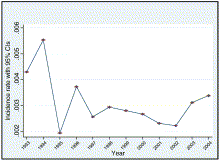HIV testing in US EDs, 1993-2004☆
Affiliations
- Department of Emergency Medicine, Warren Alpert Medical School of Brown University
- Department of Community Health, Warren Alpert Medical School of Brown University
- Department of Emergency Medicine, Rhode Island Hospital, Providence, RI 02903, USA
Correspondence
- Corresponding author. Tel.: +1 401 444 5109; fax: +1 401 444 4307.

Affiliations
- Department of Emergency Medicine, Warren Alpert Medical School of Brown University
- Department of Community Health, Warren Alpert Medical School of Brown University
- Department of Emergency Medicine, Rhode Island Hospital, Providence, RI 02903, USA
Correspondence
- Corresponding author. Tel.: +1 401 444 5109; fax: +1 401 444 4307.
Affiliations
- Department of Emergency Medicine, Warren Alpert Medical School of Brown University
- Department of Community Health, Warren Alpert Medical School of Brown University
To view the full text, please login as a subscribed user or purchase a subscription. Click here to view the full text on ScienceDirect.

Fig. 1
Incidence rate of HIV testing by year, 1993-2004.
Abstract
Objectives
The aims of the study were to (1) estimate the incidence rates (IRs) of human immunodeficiency virus (HIV) testing among 13-year-old to 64-year-old patients in US emergency departments (EDs); (2) determine ED compliance with Centers for Disease Control and Prevention (CDC) recommendations for HIV testing for patients with nonsexual blood or body fluid exposures, sexually transmitted diseases (STDs), and sexual assaults; and (3) ascertain if HIV testing in EDs varies by patient demographic characteristics.
Methods
The ED visits from the National Hospital Ambulatory Medical Care Survey databases (1993-2004) were analyzed. Visits for nonsexual blood or body fluid exposures, STDs, and sexual assaults were identified using diagnosis and cause codes. Incidence rates for HIV testing were estimated by year. Odds ratios (ORs) with 95% confidence intervals were estimated from multivariable logistic regression models using HIV testing as the outcome and demographic characteristics as covariates.
Results
The average IR of HIV testing for 13-year-old to 64-year-old patients from 1993 to 2004 was 0.31%. Of all patients, 35.1% with nonsexual blood or body fluid exposures, 20.4% with sexual assaults, and 2.6% with STDs were tested for HIV. The HIV testing was more frequent among Hispanics (OR, 1.39 [1.06-1.81]), blacks (OR, 1.52 [1.19-1.94]), patients with Medicaid (OR, 2.35 [1.81-3.03]), Medicare (OR, 1.95 [1.20-3.16]), and self-pay/no charge/other type of insurance (OR, 1.74 [1.35-2.23]), and those visiting EDs in the northeastern United States (OR, 1.57 [1.04-2.38]).
Conclusions
The HIV testing rates are low in US EDs and have changed little for a 12-year period. Compliance with CDC recommendations for HIV testing is poor and not in accordance with risk for infection. Hispanics, blacks, and those without private health care insurance are being tested more frequently than other ED patients.
To access this article, please choose from the options below
Purchase access to this article
Claim Access
If you are a current subscriber with Society Membership or an Account Number, claim your access now.
Subscribe to this title
Purchase a subscription to gain access to this and all other articles in this journal.
Institutional Access
Visit ScienceDirect to see if you have access via your institution.
☆Dr Merchant was supported by a career development grant from the National Institute for Allergy and Infectious Diseases, Bethesda, MD (K23 A1060363).
The results of this study were presented at the Centers for Disease Control and Prevention National HIV Prevention Conference on December 3, 2007.
Related Articles
Searching for related articles..


